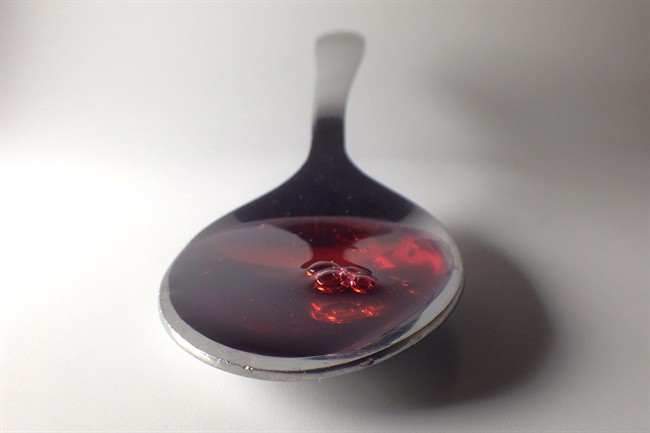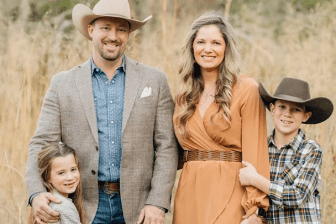TORONTO – Your toddler is coughing and sneezing with a runny nose and a fever. When the common cold strikes, it’s a parental instinct to look after your child, but that doesn’t necessarily mean you should give your baby or toddler cough and cold medicine.

In a timely message as the cold and flu season arrives, the U.S. Food and Drug Administration is recommending against over-the-counter cold medication in young kids. It’s still unclear how beneficial they are while the risks of overdosing or side effects are more worrisome, the FDA warns.
It’s specifically against over-the-counter (OTC) medication for children under 2.
“A cold is self-limited; and patients will get better on their own in a week or two without any need for medications. For older children, some OTC medicines can help relieve the symptoms – but won’t change the natural course of the cold or make it go away faster,” Dr. Amy Taylor, the FDA’s pediatrician, said in a consumer update.
READ MORE: How do you treat the common cold? Here’s what works and what doesn’t
The common cold is a viral infection – it can’t be treated with antibiotics, she explained. Ultimately, watchful waiting works best.
“Kids are going to get colds. They’re going to get four, five, six a year sometimes. We don’t necessarily have to do anything. They’re going to last seven to 10 days regardless of what we do, and kids are generally going to eat and sleep adequately and then bounce back nicely,” according to Dr. Deb Lonzer, a Cleveland Clinic pediatrician.
- Canadian man dies during Texas Ironman event. His widow wants answers as to why
- ‘Sciatica was gone’: hospital performs robot-assisted spinal surgery in Canadian first
- Canadians more likely to eat food past best-before date. What are the risks?
- Treatment from female doctors leads to lower death rates, study finds
The FDA’s consumer update builds on other guidelines that advise against OTC cough and cold meds for young kids.
The American Academy of Pediatrics, for example, says that kids under 4 should never take a cough or cold medicine.
In 2008, Health Canada told parents not to give OTC medicines to their kids under 6 who were battling the common cold. It was due to “limited evidence” that the medication worked.
READ MORE: Telling the difference between cold and flu symptoms
It even forced manufacturers to relabel more than 700 products so that “do not use in children under 6” warnings were slapped on. Health Canada made that call after an extensive review – its concern was dosages and side effects.
Within a 13-year timespan leading up the review, the federal agency received 164 reports of adverse reactions in kids under 12 because of OTC cough meds. Young kids encountered increased heart rate, decreased consciousness, abnormal heart rhythms and even convulsions.
“We found that parents often can make errors with liquid medications. It’s often difficult for them to correctly measure liquid medications because they don’t understand what a millilitre is or may be confused about the difference between a teaspoon and tablespoon,” Taylor said.
READ MORE: Anti-vaccination movement means preventable diseases making a comeback
So what options do parents have? Earlier this year, a Canadian researcher and family doctor studied what works best against the common cold. A laundry list of remedies – vitamin C, Echinacea, vapour rub, ginseng, gargling salt water, nasal sprays – were all considered in the review.
“People get frustrated when there’s not much they can do so they go looking. We believe in theories or possible naturopathic therapies that really don’t have a lot of research to back them in hopes that they do something,” Dr. Michael Allan told Global News.
“It’s born out of a hope that there could be something to prevent or improve your situation.”
READ MORE: 4 winter weather health risks
Allan is a family physician and professor at the University of Alberta.
There’s some research that suggests that adults could get a small or moderate benefit from a combination of antihistamines and decongestants with acetaminophen or ibuprofen. (Allan couldn’t name brand names in the case of drugs, but typical antihistamines include Benadryl or Sudafed, while acetaminophen is more commonly known as Tylenol and ibuprofen as Advil.)
Kids under five years old shouldn’t be taking any antihistamines — but if they’re dealing with aches, pains or a sore throat, acetaminophen or ibuprofen are good choices, the latter being the best option, Allan said.
Honey was even a promising candidate to tame a child’s cold, but not for babies 12 months and under. For other youngsters, Allan said research pointing to 2.5 to 10 millilitres — or half a teaspoon to two teaspoons — of honey right before bed. It’ll help kids and parents sleep through the night.
Cough medicines didn’t seem to benefit kids but they might offer a “slight” benefit in adults.
Read the Canadian Paediatric Society’s guidelines here.
carmen.chai@globalnews.ca
Follow @Carmen_Chai




Comments